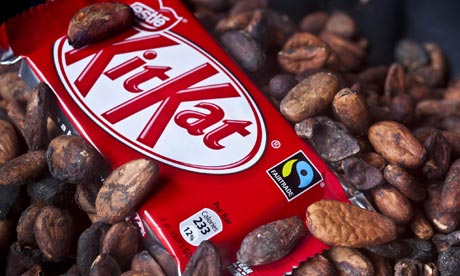Ghana Pics
Wednesday, December 9, 2009
Give Me a Break
Apologies for the lack of posts over this past month--I spent much of November travelling up the East Coast visiting friends and family and basically just relaxing after five months in the field. It was good. However, I intend to get back to reporting on Ghana and fair trade now. Though, as I told someone earlier today, my blog should now be called "Out of West Florida", though that's not quite as exciting as "Out of West Africa." So it goes.
On Monday, approximately 23482301283.21 of my friends alerted me to the fact that Nestle was switching its line of British Kit Kats to Fairtrade. You know who you are. This barrage of e-mails--many of which arrived before I woke up that morning--has led me to believe that my friends now think of me whenever they see fair-trade or organically certified chocolate. Excellent. I, for one, cannot walk through a Whole Foods or a Wal-Mart (that covers the whole spectrum of grocery choice, right?) without nosing through the chocolate section, perusing the various organic, fairtrade, rainforest-friendly, we-love-the-insert-cause-here lines of chocolates. But I digress.
This is exciting news, nonetheless. In case you don't believe me, look at all these outlets covering the story:
The Guardian
Times of London
BBC News
Wall Street Journal
Nestle sources much of its chocolate from Cote d'Ivoire, a country to which I will be travelling in January. Cote d'Ivoire's cocoa system is set up quite differently from Ghana's, and the country's political situation is a bit more fractious--as a result, the cooperatives formed from this fairtrade switchover could have significant implications for democracy in Cote d'Ivoire. I guess we'll have to wait and see.
Update: Please see comments below for Mike Brady's perspective on Nestle's fairtrade Kit Kat announcement.
Subscribe to:
Post Comments (Atom)


3 comments:
Oh, what would you do without me? You'd only have 23482301282.21 notifications of the next big free-trade news event, which clearly is inadequate.
True that, man. In fact, you make keeping up with fairtrade news as easy as 3.14159.
You are going to have a long wait. Nestlé is sourcing 1% of its cocoa purchase from Fairtrade sources for its 4-bar KitKat. It is costing it 1% of its current Nescafé advertising campaign in the UK and gaining it far more publicity - virtually all of it missing the wider context of Nestlé's involvement in cocoa.
Nestlé has been taken to court in the US for failing to act on a 2001 agreement to end child slavery in its cocoa supply chain and in the past has boycotted a meeting by Senator Horkins (co-sponsor of the Horkins-Engel Protocol in the US) called to examine lack of progress. There are 11 million people dependent on cocoa farming in West Africa, many of them dependent on Nestlé. The KitKat products involved in this scheme will benefit only 6,000 farmers. There is a danger that the improved conditions for the 6,000 farmers will divert attention from the many others outside the scheme, and be used deliberately to this end by Nestlé.
Stop the Traffik, founded by Steve Chalke, the United Nations Special Advisor on Community Action Against Human Trafficking, said in response to the announcement that ‘two finger’ Kit Kats and all of Nestlé's other chocolate products "“will continue to exploit the chocolate slaves of the Ivory Coast from where Nestlé source most of their cocoa”." See:
http://www.ekklesia.co.uk/node/10757
This is a similar situation to its Fairtrade coffee, which involves just 0.1% of the coffee farmers dependent on it, but is used to suggest it is making a huge difference, providing cover for continued unethical practices. That was launched in 2005 with those in favour of conceding certification for so little arguing Fairtrade would expand through Nestlé's coffee purchasing. It hasn't - Nestlé still has the one Fairtrade coffee to give it access to the 'ethical' market and lots of good PR.
In addition, Nestlé is the most boycotted company in the UK and one of the four most boycotted companies on the planet according to GMIPoll because of the way it pushes its breastmilk substitutes. Nestlé systematically breaches the baby milk marketing standards adopted by the World Health Assembly, undermines breastfeeding and contributes to the unnecessary death and suffering of babies. According to UNICEF, 1.5 million babies die around the world every year because they are not breastfed. Even Nestlé's Global Public Affairs Manager, Dr. Gayle Crozier Willi, admitted in 2007 that Nestlé is 'widely boycotted'.
Fairtrade KitKat will be added to the boycott list. The boycot has forced some changes in Nestlé marketing practices and policies, but the company, the market leader, refuses to make all necessary changes and is still the worst of the baby food companies. At the present time it is being targeted for practices that include claiming its infant formula 'protects' babies - it does not, babies fed on it are more likely to become sick than breastfed babies and in conditions of poverty, they are more likely to die.
Its Fairtrade product should be seen in this context.
Please see my blogs on this topic, which include a quote from me:
http://boycottnestle.blogspot.com/2009/12/nestle-fairtrade-two-fingers.html
Post a Comment